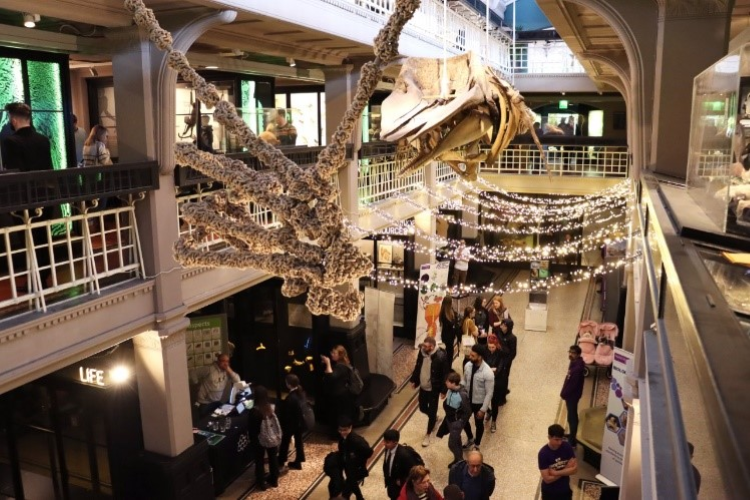
Connecting through science: Manchester Museum hosts British Science Week
Article written by Samuel Hurley, Social Responsibility and Public Engagement Intern.
Engaging with millions of people each year, British Science Week (10-19 March 2023) is one of the largest national science festivals in the world. Through thousands of events hosted in universities, museums and public spaces, the annual festival celebrates and fosters an interest in STEM for people of all ages.
Nestled amongst a display of natural history specimens, including a giant sperm whale, the Faculty of Biology, Medicine and Health was out in force, sharing research in hands on and engaging ways to inspire a new generation of scientists and healthcare workers, at the recently refurbished Manchester Museum. ‘Connections’ was the theme of this year’s Festival, providing a chance to explore the importance of connections within and in advancing science.
For the FBMH Museum of Medicine and Health (MMH), the festival was a chance to take part in another large-scale schools event. Since 2015, supported by the family of past Medical School’s Executive Dean, Dr F.B. Beswick (1925-2019), the museum has facilitated an annual Inspiring Futures event to promote the variety of careers in healthcare. In past events the museum has teamed up with colleagues including from the School of Materials and Optometry.

MMH placement student, Esha Mishra, shares the history of the Christie Hospital.
This year, MMH connected with Cancer Research UK Manchester Institute. Pupils met cancer research scientists and with a mock-up of a medical screening assay, used pipettes to test simulated patient samples for cancer biomarkers. Through artefacts and historic maps, MMH helped to make connections with the history of the Christie Hospital in Withington, one of the largest cancer treatment centres in Europe. The architecture of the new Paterson building, a significant milestone for cancer research in the city, was also celebrated.
This year’s event was one to remember. Populated by a diversity of stands, colleagues and volunteers across the Faculty hosted hands on experiments and testing with enlightening results! To name but a few:
To clean or not to clean: Medical Microbiology researchers demonstrated that microbes are everywhere! By using swabs and using UV GERM hand hygiene lotion, the pupils got to grips with how easily microbes can spread. Making links with a change of behaviour was one of the desired outcomes for the experiments.
Fighting Deadly Fungi: Manchester Fungal Infection Group explained the threat of deadly fungal infection. Pupils made connections with the discovery of Penicillium and learned how the team study infectious fungi in the lab by having a go at interactive activities. Conversations around antimicrobial resistance (AMR), got all thinking about the ethical and financial issues around antifungal use.
Getting rid of viruses from the body: The Lydia Becker Institute invited pupils to highlight the role immune cells play in ridding the body of viruses. Through games including “splat the rat”, the schools understood viruses and experts were on hand to discuss good and bad bugs in the gut plus answer question on the COVID-19 pandemic.
Midwifery as a career: The young people took part in a hands-on activity palpating a model pregnant abdomen and feeling for parts of the foetus. By meeting midwives, the pupils learnt about the profession.

Stroke researchers engage with the public, demonstrating structural changes to the brain following stroke.
Brain Research: Stroke researchers from the Geoffrey Jefferson Brain Research Centre demonstrated live microscope images of ischaemic and haemorrhagic stroke, and pupils discovered how different areas of the brain can be affected after stroke through an interactive build-a-brain activity.
Manchester Museum is one of the UKs largest university museums. It reopened to the public in February following an ambitious £15 million transformation. Why not sign up to their newsletter. Home – Manchester Museum
Find out what other activities took place in the Faculty: Schoolkids take up the animal research challenge for British Science Week (manchester.ac.uk)

0 Comments